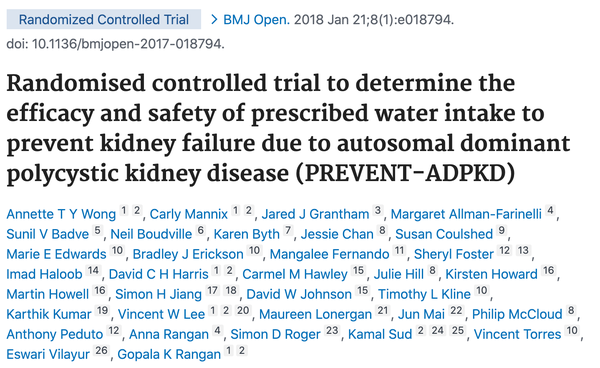Wong A. et al. 2018
Randomised controlled trial to determine the efficacy and safety of prescribed water intake to prevent kidney failure due to autosomal dominant polycystic kidney disease (PREVENT-ADPKD)
Abstract
Introduction:
Maintaining fluid intake sufficient to reduce arginine vasopressin (AVP) secretion has been hypothesised to slow kidney cyst growth in autosomal dominant polycystic kidney disease (ADPKD). However, evidence to support this as a clinical practice recommendation is of poor quality. The aim of the present study is to determine the long-term efficacy and safety of prescribed water intake to prevent the progression of height-adjusted total kidney volume (ht-TKV) in patients with chronic kidney disease (stages 1-3) due to ADPKD.
Methods and analysis:
A multicentre, prospective, parallel-group, open-label, randomised controlled trial will be conducted. Patients with ADPKD (n=180; age ≤65 years, estimated glomerular filtration rate (eGFR) ≥30 mL/min/1.73 m2) will be randomised (1:1) to either the control (standard treatment+usual fluid intake) or intervention (standard treatment+prescribed fluid intake) group. Participants in the intervention arm will be prescribed an individualised daily fluid intake to reduce urine osmolality to ≤270 mOsmol/kg, and supported with structured clinic and telephonic dietetic review, self-monitoring of urine-specific gravity, short message service text reminders and internet-based tools. All participants will have 6-monthly follow-up visits, and ht-TKV will be measured by MRI at 0, 18 and 36 months. The primary end point is the annual rate of change in ht-TKV as determined by serial renal MRI in control vs intervention groups, from baseline to 3 years. The secondary end points are differences between the two groups in systemic AVP activity, renal disease (eGFR, blood pressure, renal pain), patient adherence, acceptability and safety.
Ethics and dissemination:
The trial was approved by the Human Research Ethics Committee, Western Sydney Local Health District. The results will inform clinicians, patients and policy-makers regarding the long-term safety, efficacy and feasibility of prescribed fluid intake as an approach to reduce kidney cyst growth in patients with ADPKD.
Other abstracts you could be interested in...
- Kavouras S.A. et al. 2021, Urine osmolality predicts calcium-oxalate crystallization risk in patients with recurrent urolithiasis
- Adams JD et al. 2021, Combining urine color and void number to assess hydration in adults and children
- Brunkwall et al. 2020, High water intake and low urine osmolality are associated with favorable metabolic profile at a population level: low vasopressin secretion as a possible explanation
- Perrier E. et al. 2015, Twenty-Four-Hour Urine Osmolality as a Physiological Index of Adequate Water Intake
